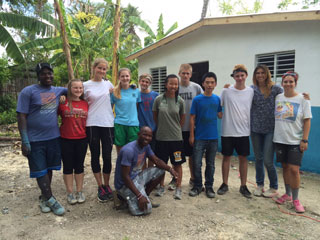Why did you decide to volunteer abroad with Rustic Pathways in the Dominican Republic?

Claire: Originally, I was going to go on an international service trip with another organization, but I was too late and missed the application deadline. Later, I found out about Rustic Pathways through Key Club International, a high school community service organization and Rustic Pathways partner.
I was at a Key Club convention and saw that they were passing out information booklets about Rustic Pathways. After reading the packet I was sold; it sounded AMAZING. The first thing I did after getting home was look them up on their website. Although I was a little overwhelmed by all of the choices I had (19 countries and over 90 programs), choosing the Dominican Republic was easy.
I found that they had a few programs designed just for Key Clubbers. Of course, I narrowed those few programs down by picking the longest and most interesting one: Life in the Bateyes- Dominican Republic.
At this point, I was just excited to do service abroad and didn't really care where it was. To be honest, I didn't even know where the Dominican Republic was until AFTER I signed up.
What was the best moment of the trip?
Claire: The best moment of the trip... That's difficult to say because everything about the trip was truly wonderful. One of the things I loved most was the language exchange with the Detroit Tigers Dominican baseball players.Originally, this wasn't even on the trip itinerary.
We only had the chance to do this because there was a storm and we couldn't go where we had planned to go. During the language exchange, we went into groups of 2 Rustic students with 2-4 Dominican baseball players. We had a few hours to get to know each other as much as possible, except there was one catch: Dominicans had to speak English and Rustic students had to speak Spanish.
This was very interesting for a lot of us because some of us don't speak Spanish at all. There was a language barrier, but we all had a lot of fun trying to act out what we were trying to tell each other. Oddly enough, I bonded most with the player who spoke the LEAST English. In just a few hours, I was able to learn a lot about these players: their family, their favorite foods, their dreams.
At the end, we had to present what we found about the others; again, Dominicans in English and Rustic students in Spanish. I totally butchered the Spanish part, but I think everyone got a laugh out of it. When it was time to leave I almost cried, knowing I would probably never see them again. Hopefully, they make into the U.S. major leagues because then I might be able to see them again. I'm crossing my fingers.
What was the most challenging aspect of the trip? Most rewarding?
Claire: There is a clear winner for "most challenging" part of this trip: the weather. One cannot stand outside more than a few minutes without dripping with sweat. This is also one of the most memorable aspects of the trip because I don't think I will sweat this much ever again. Don't worry though because the showers are cold showers and it feels like heaven after a long day of work.
The most rewarding has to be seeing the product of our hard work. On this trip, we built a home for a family of 7 who had one that was falling apart. No one would ever think that a groups of teenagers could do such an amazing thing, but we did it. After we finished the house, we had a ceremony to officially give the family the brand new home.
Even though everybody at the ceremony spoke Spanish and I understood about 1% of it, it was still an emotional experience. Seeing the happy looks on the family members' faces was the most rewarding aspect of this trip.
What's something interesting about the Dominican Republic that the average person doesn't know?

Claire: In the beginning, I did not even know where the Dominican Republic was, but this trip has educated and given me a new pair of glasses to see the world in. The Dominican Republic is the east part of the island of Hispaniola (the west is Haiti) in the Caribbean. More than 40% of the population live in extreme poverty, making none to four U.S. dollars per day.
Many of these impoverished people are immigrants from Haiti who came to the Dominican Republic in search of the jobs and the better lives that they usually won't end up finding. Because most of them already had little education and experience to begin with, many end up working as the lowest of the lower class: in the sugarcane fields.
The sugarcane cutters work for the large, corrupt sugarcane companies who often cheat the workers and don't pay them at all. Hearing this kind of news on television is definitely not the same as seeing it in person. After witnessing this poverty for myself, I pondered over how these people could possibly be live like this. The United States is the largest customer of Dominican sugar, and even pays double the price for it. When I first heard about this, I was completely puzzled as to why the U.S. would pay so much for sugar.
Then, I was told by a visiting lawyer that the U.S. pays the sugar companies double in hopes of better work environments and treatment for the cane cutters. A few years ago, the Dominican Republic's issue about this rose to international news. The United States and United Nations is now trying to something because the sugar cane companies are getting richer and richer, while hardly any money actually goes to the hardworking cane cutters.
This was extremely shocking for me because I live in a world where everything is always fine and dandy, where this sort of thing doesn't happen. I hope that more people are educated about the harsh conditions of cane cutters in the Dominican Republic, and that we come up with a solution before any more damage is done.